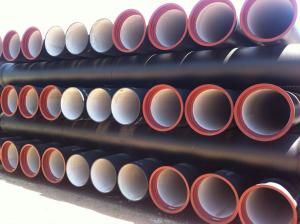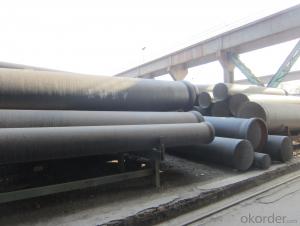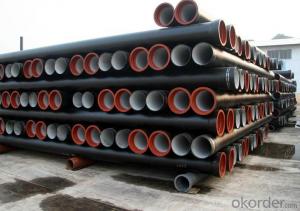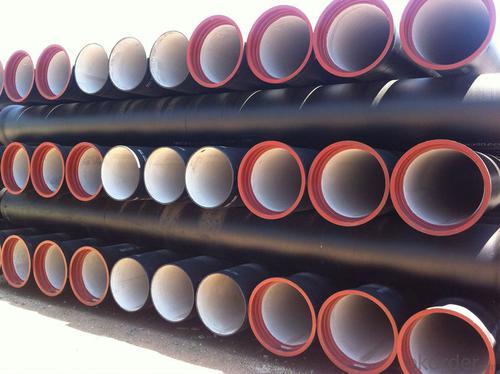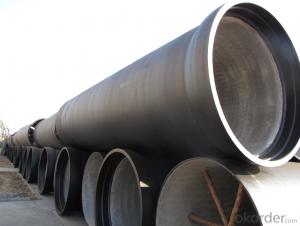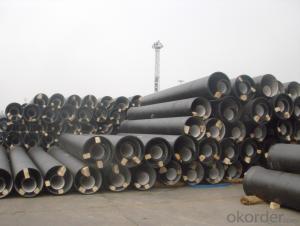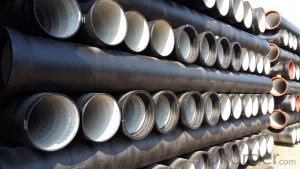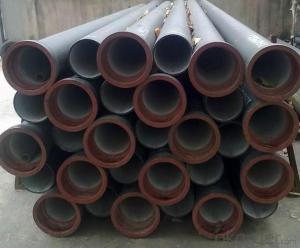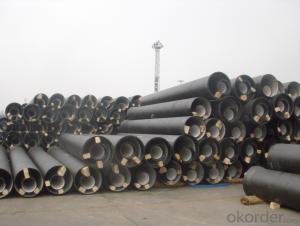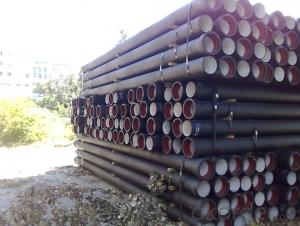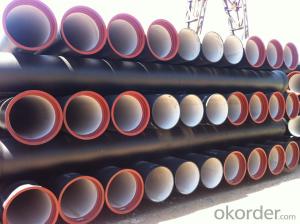Ductile Iron Pipe of China DN80-DN800 K8 EN545 Top Sale
- Loading Port:
- China main port
- Payment Terms:
- TT or LC
- Min Order Qty:
- 25 m.t.
- Supply Capability:
- 100000 m.t./month
OKorder Service Pledge
OKorder Financial Service
You Might Also Like
1. Ductile Iron Pipe Description :
1) Pipes confirm to ISO2531,K9 class,T type joint,6m long,with inside cements lining conform to ISO4179, outside Zinc spraying(130g/m2) and bitumen coating(70μm) conform to ISO8179.
2) Pipe ends: Spigot and socket ends, with 100% SBR rubber gaskets accoding to ISO4633
3) we can do third party inspection according to customer's request.
4) Our products have been sold to many international market, such as Middle East and South East Asia and Africa.
2. Main Features of the Ductile Iron Pipe:
•High yield strength
•High tensile Strength
•High corrosion resistance
•Pressure Resistence
•Anti-corrosion
•Installation is convenient
•Satisfy the highest hygienic standards
1).Service
• Drawing: we can translate your original drawing, offer best suggestion on design
• Quality: we have full set quality control system to guarantee the best quality.
• Inspection: inspect in house, all our products must be checked 3 times before packing
2)Inspection
• In-house Foundry
• Third party inspection available upon requirement
3) Our goal
• To be your preferred partner
3. Ductile Iron Pipe Images:
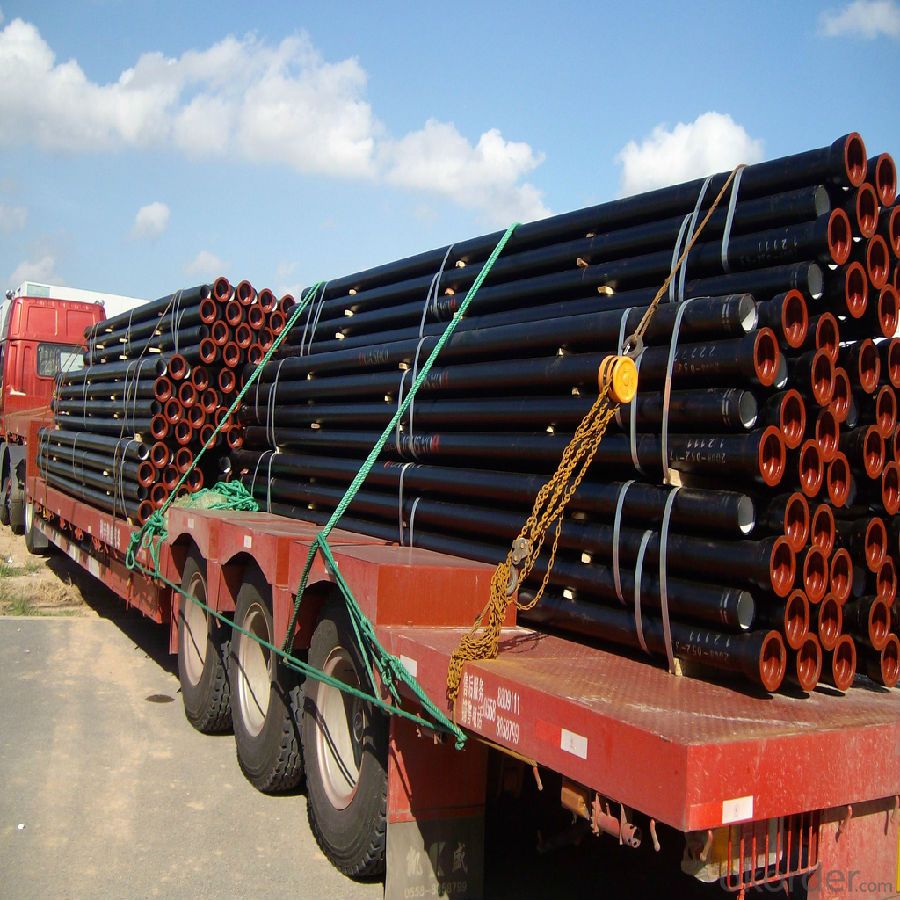
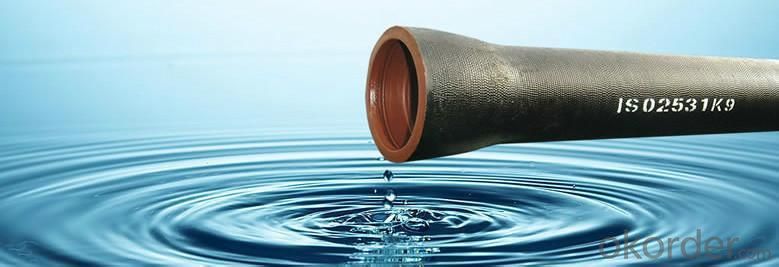
4. Ductile Iron Pipe Specification:
Surface Finishes: Bare, Oiled, Mill Varnish, Galv,FBE, FBE Dual, 3LPE, 3LPP, Coal Tar,Concrete Coating and Tape Wrap
End Finishes: Beveled, Square Cut, Threaded, hat
Additional Services: Internal Coating
Inspection: MOODY SGS BV GL DNV ABS LIOYD’S
Test: X-ray, UT, magnetic particle,inspection,hydrostatic test.
Processing service: Beveling, Threading, Slotting, Cut-to length, Bends, Quench and Temper, Fabrication, Double-jointing and On-site assistance
Documentary: MTC, material certification,Origin certification, CI or PI,Test Report, export licence, handling order, B/L,insurance policy,shipping instructions, contract, packing list etc.
Internal lining: ductile iron pipes shall have an internal cement mortar lining in acc with ISO4179.
External coating: ductile iron pipes shall be externally coated with metallic zinc spray plus a further layer of resin painting to ISO8179.
Gasket: 100% SBR/NBR/EPDM rubber gasket in accordance with ISO4633.
Packing: ductile iron pipes from DN100 to DN300 be bundled with steel belts, others are in bulk.
Payment term: L/C, T/T.
5. FAQ:
We have organized several common questions for our clients,may help you sincerely:
1.Q: Why would you choose ductile iron pipe rather than other pipe materials?
A:The reasons are obvious for that not only ductile iron pipe possesses the inherent strength and flexibility of ductile iron, combined with proven corrosion protection systems, but also the cost savings can be achieved from design to installation and commissioning.
2.Q:Why can you guarantee the inner of pipes can’t be corroded?
A: High alumina cement mortar lining and sulphate-resistant cement mortar lining. These two special linings are applicable to inner anti-corrosion for sewage pipes, improving resistance to erosion of the sewage components.
- Q: Can ductile iron pipes be used for slurry transportation?
- Yes, ductile iron pipes can be used for slurry transportation. Ductile iron pipes are known for their high strength and durability, making them suitable for various applications including slurry transportation. Slurry is a mixture of solid particles and a liquid, which can be abrasive and corrosive. Ductile iron pipes have excellent resistance to abrasion, corrosion, and erosion, making them capable of handling the challenges posed by slurry transportation. Additionally, ductile iron pipes offer a smooth inner surface, reducing friction and improving the flow of slurry. Therefore, ductile iron pipes are a reliable choice for slurry transportation systems in industries such as mining, wastewater treatment, and oil and gas.
- Q: Can ductile iron pipe be used for fire protection systems?
- Yes, ductile iron pipe can be used for fire protection systems. Ductile iron pipe is known for its strength and durability, making it suitable for various applications, including fire protection systems. Its high tensile strength and resistance to cracking and breaking make it a reliable choice for transporting water and other fire suppression agents. Additionally, ductile iron pipe has excellent corrosion resistance properties, ensuring long-term performance and reliability in fire protection systems. Overall, ductile iron pipe is a suitable and commonly used material for fire protection systems due to its strength, durability, and corrosion resistance.
- Q: What are the advantages of cast iron pipes?
- The cast iron pipe has good sealing performance and is not easy to leak. It can reduce the leakage rate of the pipe network and reduce the daily maintenance cost of the pipe network
- Q: Are ductile iron pipes resistant to chloride-induced corrosion?
- Indeed, chloride-induced corrosion can be effectively resisted by ductile iron pipes. Ductile iron, a variant of cast iron fortified with magnesium for enhanced malleability and crack resistance, possesses a ferritic microstructure that grants exceptional resilience against chloride-induced corrosion. The interaction between chloride ions in water or soil and the metal surface can lead to the development of corrosion byproducts like rust. Nonetheless, the inclusion of magnesium in ductile iron forms a protective coating, preventing the infiltration of chloride ions and thus impeding corrosion. Consequently, ductile iron pipes are well-suited for a broad spectrum of applications, including water supply and sewerage systems, wherein exposure to chlorides is prevalent.
- Q: What is the expected surge pressure rating of ductile iron pipes?
- The expected surge pressure rating of ductile iron pipes can vary depending on factors such as pipe diameter, wall thickness, and application. However, generally speaking, ductile iron pipes have a surge pressure rating that ranges from 350 psi to 500 psi.
- Q: What if the ductile iron pipe is broken?
- It is recommended that you used to repair defects of cast iron machine, are currently on the market to sell, but also can ensure welding intact appearance, make your products by quality, but if it is in the use of performance can not meet the effect, especially the pipeline pressure quite big, what methods are of no use that must be re cast as the new.
- Q: How are ductile iron pipes protected against external damage?
- Various protective measures are employed to shield ductile iron pipes from external damage. One commonly used method entails applying a protective coating to the pipe's outer surface. This coating acts as a barrier, preventing direct contact between the pipe and corrosive elements in the surrounding environment. Materials like epoxy, polyurethane, or zinc, which exhibit excellent resistance against corrosion, abrasion, and chemical attacks, can be utilized for this purpose. Furthermore, an additional layer of protection can be provided by encasing ductile iron pipes in a concrete or cement mortar lining. This lining not only reduces the likelihood of physical damage caused by external impacts or soil movement but also enhances the pipe's hydraulic performance by minimizing friction and maintaining a smooth flow of fluids. In addition, proper bedding and backfilling techniques are employed during the installation of ductile iron pipes. This involves using appropriate materials such as sand or gravel to support and stabilize the pipe, thereby minimizing the risk of external damage resulting from uneven ground settlement or heavy loads. Compacting the backfill material adequately is vital to ensure the long-term integrity and stability of the pipe. Regular inspection and maintenance are also crucial for safeguarding ductile iron pipes against external damage. Routine inspections can identify any signs of corrosion, coating deterioration, or physical harm, enabling timely repairs or replacement before significant issues arise. Additionally, employing proper cathodic protection systems can counteract electrochemical reactions occurring on the pipe's surface, preventing corrosion by applying an electric current. To summarize, the protection of ductile iron pipes against external damage encompasses the application of protective coatings, concrete or cement mortar linings, appropriate bedding and backfilling techniques, and regular inspections and maintenance. These measures collectively ensure the durability, longevity, and dependable performance of ductile iron pipes in various environments and applications.
- Q: Are ductile iron pipes suitable for use in residential plumbing?
- Ductile iron pipes are indeed a suitable choice for residential plumbing. This material, known for its strength and durability, is resistant to corrosion, making it highly advantageous for plumbing systems. With its remarkable tensile strength, ductile iron pipes can endure high pressure and are less prone to cracking or breaking, unlike other materials. Moreover, these pipes are renowned for their extensive lifespan, lasting over 100 years, guaranteeing reliability in residential plumbing systems. Furthermore, ductile iron pipes exhibit exceptional flow characteristics, ensuring efficient water distribution throughout the entire household. In conclusion, the strength, durability, and corrosion resistance of ductile iron pipes render them a fitting and long-lasting solution for residential plumbing needs.
- Q: Ductile iron pipe, socket connection, pipe length, you can cut open it?
- The cutting length is 4 meters from the jack. Among them, DN300 below 100% can be cut, DN350 above shear ratio is 10%, cut the small head to do chamfering treatment.
- Q: How are ductile iron pipes connected together?
- Ductile iron pipes are commonly joined together using different methods, which vary depending on the specific application and requirements. The most frequently used method for connecting these pipes is through mechanical joint fittings. These fittings consist of one pipe with a bell end and another with a spigot end, which are joined using bolts or clamps and a rubber gasket. The rubber gasket ensures a tight seal, while the bolts or clamps secure the joint and prevent any movement or separation. Another approach to connecting ductile iron pipes is through flanged joints. This involves attaching a flange to the end of each pipe and then fastening them together using bolts and nuts. Flanged joints are commonly employed in larger diameter pipes or situations where disassembly is necessary. In addition to mechanical joint fittings and flanged joints, push-on or restrained joint fittings can also be used to connect ductile iron pipes. Push-on joints involve pushing a rubber gasket onto the spigot end of the pipe to create a secure and tight connection. On the other hand, restrained joints incorporate additional features like welded-on collars or mechanical devices to prevent movement and enhance joint strength. The choice of connection method for ductile iron pipes depends on factors such as pipe diameter, pressure requirements, and the specific application. It is crucial to adhere to the manufacturer's guidelines and industry standards to ensure proper installation and reliable performance of the connected pipes.
Send your message to us
Ductile Iron Pipe of China DN80-DN800 K8 EN545 Top Sale
- Loading Port:
- China main port
- Payment Terms:
- TT or LC
- Min Order Qty:
- 25 m.t.
- Supply Capability:
- 100000 m.t./month
OKorder Service Pledge
OKorder Financial Service
Similar products
Hot products
Hot Searches
Related keywords
